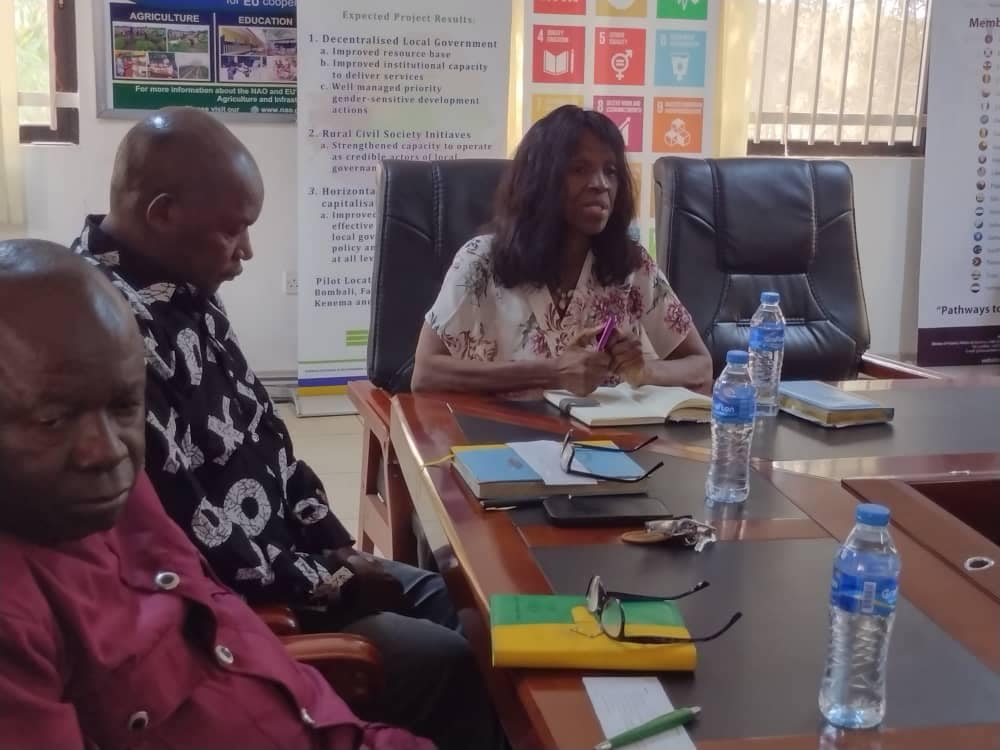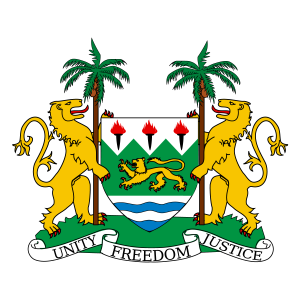
As part of the annual ministerial Performance Contract process with His Excellency the President, the Monitoring and Evaluation (M&E) Directorate of the Ministry of Planning and Economic Development (MoPED) convened the first Performance Tracking Table (PTT) meeting for 2025. The meeting, held on Thursday, March 13, 2025, at the MoPED Conference Hall, brought together the newly formed Performance Management Committee (PMC), representatives from the Office of the Chief Minister, ministers, and other key stakeholders.
The primary objective of the meeting was to reflect on the previous year’s performance review process and strategize for effective implementation in 2025. Additionally, it served as an orientation for the new PMC members, ensuring they understood their roles in tracking and improving ministerial performance under the Ministerial Indicators Matrix 2025.
Chairing the meeting, Development Secretary One, Mr. Usman C. Conteh, emphasized the importance of the PTT in achieving performance targets outlined in the Ministerial Performance Contract. He highlighted that continuous engagement and monitoring were critical for improving service delivery and ensuring that ministries meet their agreed-upon commitments.
The session was facilitated by Dr. Abdulram Sowa, Director of Performance Contract and Service Delivery, Office of the Chief Minister , who has over two decades of experience in public sector performance management. He outlined the fundamentals of the PTT, explaining its role in tracking progress, identifying challenges, and ensuring accountability at all levels of the ministry. Dr. Sowa further stressed that the Performance Contract, signed between the President and ministers, must be effectively implemented by all staff to achieve optimal results.
Providing insights on performance monitoring, Mrs. Isatu Konneh from the M&E Department within MoPED highlighted the efforts to establish the Performance Management Committee (PMC), which will be responsible for tracking progress, ensuring adherence to assigned responsibilities, and improving reporting mechanisms.
She noted that the PTT process is evidence-based, relying on practical indicators that assess both project-level and individual performance. Additionally, she introduced the composition of the PMC, which includes representatives from the Internal Audit Unit, Human Resources Unit, and senior officers from various directorates. She emphasized the importance of building the committee’s capacity to ensure they effectively oversee policy implementation and performance tracking.
In her remarks, MoPED’s Minister Kenyeh Barlay underscored the critical link between ministerial performance contracts and the broader goals of MoPED. She stressed that achieving the PTT targets requires collective teamwork and a more proactive approach to tracking progress.
Reflecting on challenges from the previous year, she expressed concern over delays in performance assessment submissions, despite multiple reminders to ministries. To address this issue, she proposed monthly performance tracking to ensure timely reporting and assessment.
Minister Barlay also emphasized that while sectoral performance had improved, these achievements were not adequately reflected in previous evaluations. She urged participants to fully understand the performance contract requirements and actively contribute to achieving the ministry’s targets.
She further expressed disappointment with past performance ratings, stating that MoPED should aim for higher rankings in future evaluations. As part of the 2025 PTT strategy, she called for greater recognition of the ministry’s contributions to national development and insisted that MoPED’s efforts be adequately captured in the performance assessment framework.
Presenting the Ministerial Performance Contract (Ministerial Indicators Matrix 2025), Mr. Fenty Bangura, Assistant Director at the M&E Directorate, outlined critical focus areas for improving performance tracking. These include: Policy, Strategy, and Legislation; Administrative and Management Efficiency (non-financial operations and dynamic reforms); Financial Stewardship and Accountability and Eradication of Corruption.
Dr. Sowa further provided guidance on effective PTT implementation, urging the PMC to focus on self-monitoring, timely reporting, professional conduct, teamwork, and maintaining service delivery standards. He stressed that ethical performance, procurement planning, and enhanced productivity are essential for strengthening the Performance Contract framework.
He encouraged all participants to put forward practical solutions that would enhance service delivery and align with the National Development Plan.
Closing the session, Mr. Usman C. Conteh reiterated the need for collaboration, sanctions, and rewards as key mechanisms to drive accountability and improve performance outcomes across government ministries.
The meeting set the stage for a more structured and effective performance tracking system in 2025. With stronger monitoring mechanisms, clearer accountability structures, and a renewed focus on teamwork, MoPED aims to enhance its performance contract implementation, ensuring improved service delivery and national development impact.
*For more information, please contact Alfred Kabia at +23279174027 or visit MoPED’s social media platforms: Twitter (@moped2025), Facebook, or the official website (moped.gov.sl)
